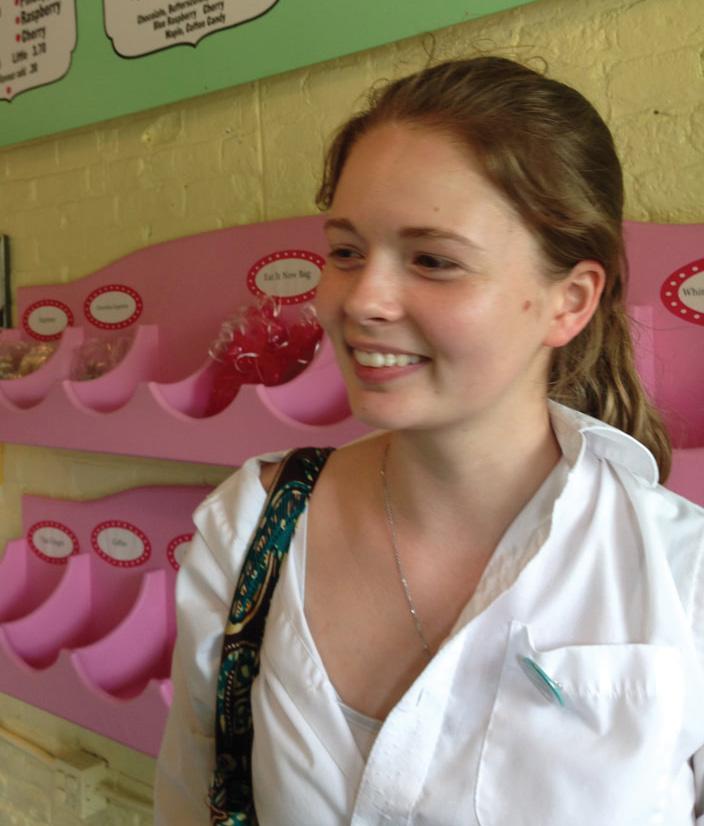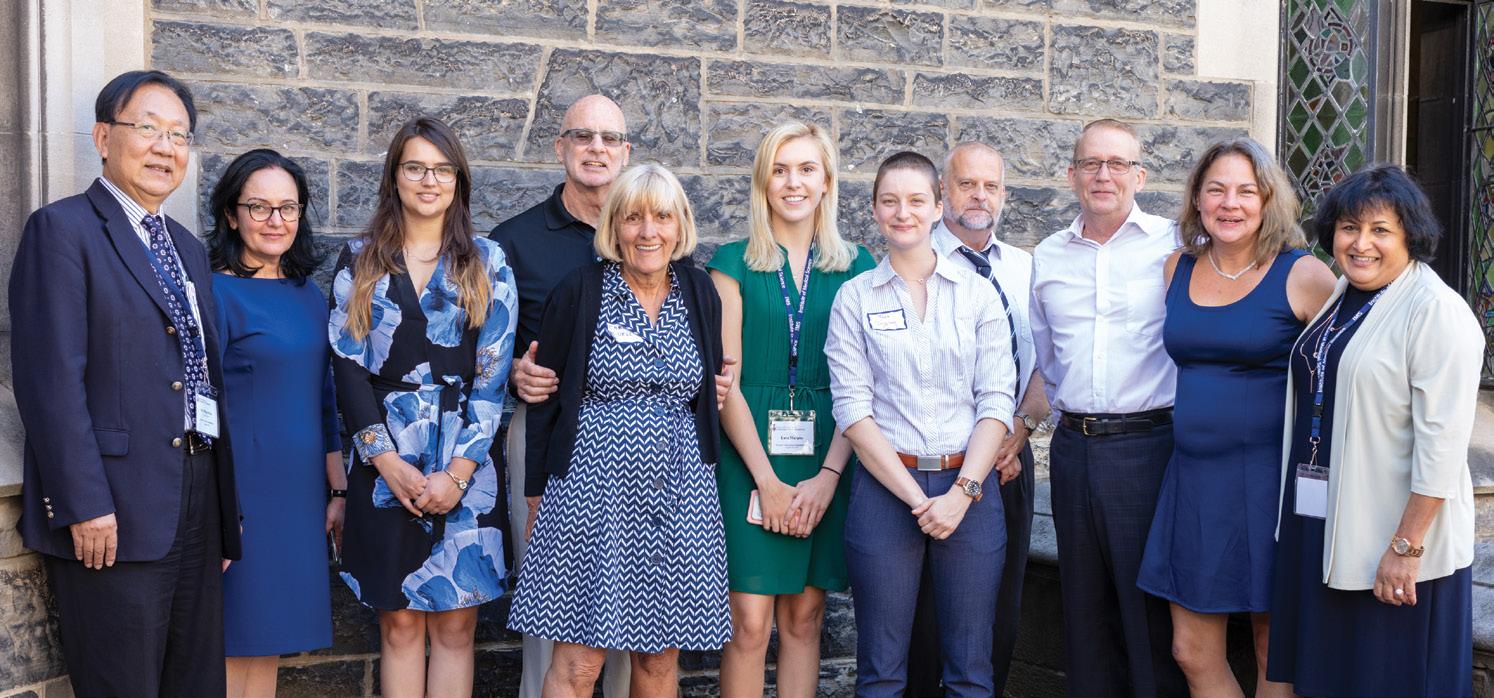
6 minute read
Student Spotlight
In remembrance of talent, commitment and kindness: The Jasmine Quigley Memorial Award
By Beatrice Ballarin & Laura Best
Advertisement

This is the story of a talented girl. A girl with a gentle soul who was bright and kind, who loved and is loved, who was full of questions and contradictions. Th is is the story of Jasmine Quigley and her memorial award.
Jasmine, or Jaz, to her friends, was an introvert. Th ough shy, she appeared strong and confi dent to her friends and peers. Th rilled to have been accepted to the UofT bioengineering program, she was excited to be a part of the Skule community. You may have even seen her in her fi rst year around campus, all purple like the tradition demands. One of the STEM girls–smart and hard-working. As fellow UofT students, we know the commitment and discipline required to get into–let alone succeed in–this prestigious program. Th ough her natural talent was undeniable, Jaz had worked hard to get into this program. To fi nally have made it into such an important school! A brief celebration before the hard work began.
Th ough the demands of bioengineering are high, it didn’t seem to be a problem for Jaz. She was the one that appeared to have it under control. Sleeping early and waking earlier, she was always ready for class or to squeeze in a quick hour of studying before the day truly began. She wasn’t a last-minute kind of student nor a puller of all-nighters. She was hard-working. She knew herself and had high expectations. She preferred to sacrifi ce time out with friends to get her schoolwork done–one-max-two bubble teas per semester. And she was okay with that. School came fi rst, that was her rule. She was a perfectionist, always on top of the workload, always organized, and calm as deadlines approached.
At least, this is how she appeared to friends and peers. Who knows how she must have really felt about it all? She kept to herself, to the point that she appeared to have it all under control. Always a support for her friends. Maybe she really did have it all under control? She was the one keeping her friends afl oat during those early weeks of fi rst year bioengineering. Th at’s who Jaz was, so kind, so caring. Competitive, but only with herself, and always very kind to the others. She was the friend, classmate, or lab-mate that everyone hoped to meet. She was a role model for those around her, and yet so young and so lost.
Did she have it under control? Maybe. Maybe she had a hard time reconciling this deeper aspect of her character, her own deep sadness, with the great student that she was and all of her achievements. It’s not an easy task, aft er all. Maybe she was too focused on her school, her future career and caring for others to think about herself, her own needs. Maybe. And still, nobody noticed this internal battle that threatened to crack her exterior. Would you have?
One thing is for sure: Jaz was an excellent student, and not only by GPA standards. Th is happens when you are simply that smart, things come easy to you. She could solve lab problems for her friends while just passing by and thinking for a second. Th at’s it, that smart. It happens; those students are rare, but they exist, and Jaz was one of them. Bright, kind, and…deeply sad.

Jasmine Quigley Photo Credit: Peter Quigley
Like all of us, Jaz was wondering about her future. What would come of her aft er those years at UofT? What would her career be like? From the girl that could do anything, how did she see herself in the future?
Curious about research in bioengineering and medicine, Jaz decided to follow her passion. Rather than applying for one of those well-paying summer jobs for engineers, those jobs that pay enough money to live like a Queen for the rest of the year, she enrolled as a summer research student earning $800 per month working at least 8 hours a day, if not more. Despite her father’s initial surprise, being a soft ware engineer himself, Jaz didn’t mind earning less than one month’s rent in Toronto. She felt it was the right way to spend her summers, investing in herself and her future, allowing her curiosity to dictate her next steps. And



those were fun summers! As you might expect from such a bright young girl, Jaz completed her summer project aft er only 6 weeks in the Hodaie lab at the Krembil Research Institute. Dr. Hodaie, a neurosurgeon scientist at Toronto Western Hospital still remembers her fondly. She had to give Jaz a second project, Dr. Hodaie recalls, because she completed the fi rst too quickly… She could give her something more complex. She remembers Jaz as a young student, incredibly bright, who quickly became an integral part of her research team. She saw something special in Jaz and wholly supported her application to the MIT research program.
When Jaz fi nally confessed her pain to her one close friend, it may have already been too late, the suff ering too deep. Th ere is no right or wrong here. Stigma and the fear of it, fear of faltering, is a serious beast–and Jasmine knew about it. She was ashamed of it and it concerned her. What would people think? She could barely accept this herself. She kept a brave façade for so long. She was suff ering in silence, quietly, composed, as her nature dictated. But still struggling to reconcile the brilliant, passionate student with the consuming sadness and lack of fulfi llment that continued to grow within, her deep contradiction. She was the stellar student; surely her mental health wasn’t a concern, right?
Yet it happens. Both things can be true; there’s no right or wrong answer.
It is diffi cult for us, as witnesses to this story, to accept the loss of such an intelligent, beautiful, kind, young soul. It is just, hard. She had so much potential. She had already accomplished so much, and she had so long to live. Who knows how much she could have achieved? But being human means having innate contradictions, beautiful and complicated and painful. A common thread of existence that can be so diffi cult to reconcile in ourselves, in others. It is impossible to know how another is feeling, so what can we do? How can we create space to support and connect? To heal? To remember those that we have lost…
And it is here that the memorial award takes place in this sad story, with the hope of fi nding a small light in the darkness. Th e Jasmine Quigley Memorial Award has been created by and her family and Dr. Hodaie to keep alive Jaz’s commitment to research; to support bright summer students that, like Jasmine, prefer to spend hot summer days in a lab devoted to researching mental health and neuroscience. Th is award is here because we don’t want to forget the hard work of students as passionate as Jaz. It serves to remind the winners that their work is valued, to celebrate them and encourage them to keep going. It serves as a reminder to us all to value the contradictions that make us human.
Always remembering their daughter, and their classmate, and their friend Jaz.
Here’s to the next Jasmine Quigley Memorial awardee: be proud of yourself, of the work you have done this summer and your impact on the world—keep going.
To learn more about the Jasmine Quigley Memorial Award, please visit: https://ims.utoronto.ca/giving.
To make a gi in support of Jasmine Quigley Memorial Award, please contact Michelle Fong, Senior Development O cer in the Faculty of Medicine at: michelley.fong@utoronto.ca.











